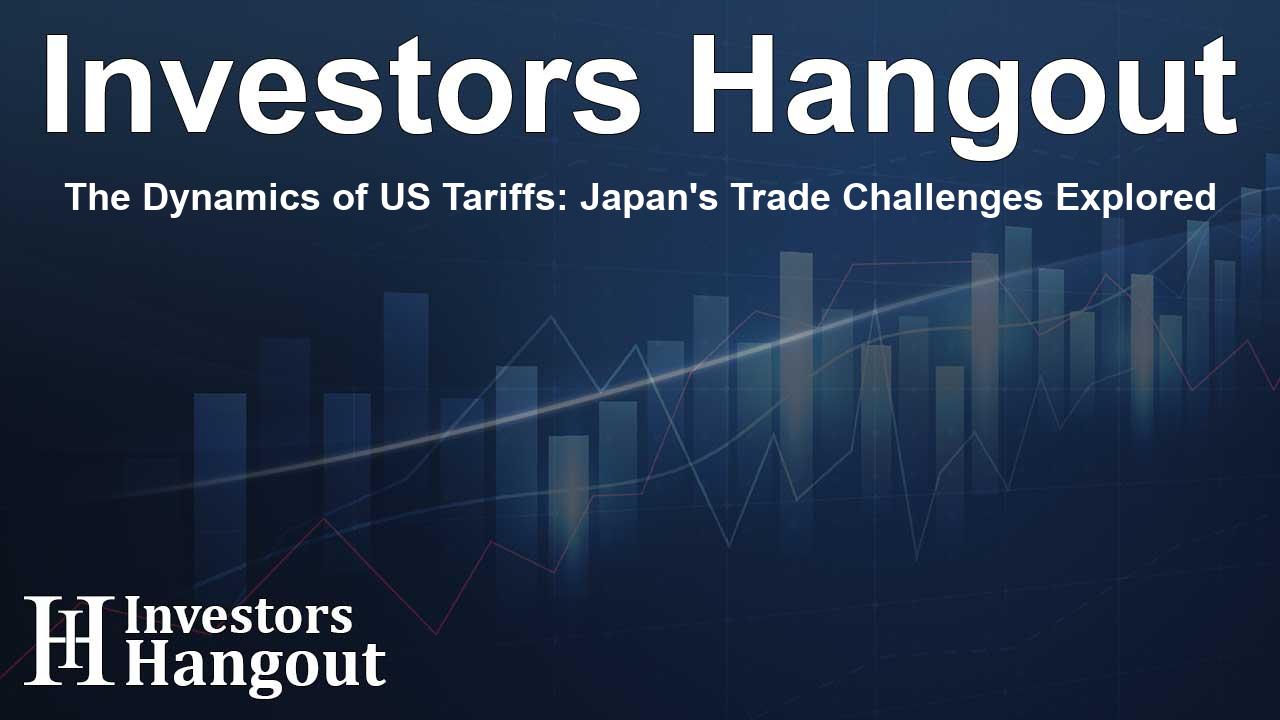The Dynamics of US Tariffs: Japan's Trade Challenges Explored

Understanding the Trade Tensions
The recent economic landscape has seen considerable tension, particularly between the United States and Japan, regarding trade negotiations. Economist Justin Wolfers has openly criticized the imposition of 25% tariffs on Japanese imports by President Donald Trump, indicating that this punitive measure lacks understanding of the existing trade dynamics.
Recent Developments in Trade Meetings
On a recent trip to Washington D.C., Japan's top trade negotiator aimed to engage in high-level discussions. Unfortunately, this attempt was met with a stumbling block when he was denied an audience with U.S. Treasury Secretary Scott Bessent. Wolfers noted this concerning scenario during an MSNBC interview, suggesting that this lack of engagement is baffling for Japan, one of the world’s leading economies.
The Impact of Tariffs on Japan
The Japanese envoy had to alter his travel schedule, hoping for meaningful dialogue that ultimately didn’t occur. As discussions with other U.S. officials were minimal, only comprising two brief phone conversations with Commerce Secretary Howard Lutnick, the absence of communication raises questions about the U.S.'s approach to negotiations. On the backdrop of these diplomatic tensions, President Trump's tariffs were implemented without substantial discussions, leaving Japan to wonder about the rationale behind such decisions.
Insights from Economists
Economists have openly expressed concerns regarding the implications of these tariffs. Peter Schiff commented on Trump's communication with Japan and South Korea, pointing to a misunderstanding of trade fundamentals. He elaborated that American trade deficits stem from consumer preferences for foreign goods rather than unfavorable trade policies imposed by Japan or South Korea.
Reactions from Japanese Officials
Japanese Prime Minister Shigeru Ishiba did not mince words when expressing his disappointment with the tariffs, calling the decision “truly regrettable.” His remarks highlight the frustration felt within Japan regarding the lack of fair negotiation, particularly concerning automobile tariffs, which have emerged as a contentious issue.
Looking Ahead for Japan
As Japan navigates these turbulent waters, the government has signified its intent to stand firm rather than make concessions easily. This perspective is crucial in understanding Japan’s strategy moving forward, especially with foreign policy intricacies at play. Negotiations appear to require more than mere tariff discussions; they necessitate a genuine commitment to dialogue from both sides.
Conclusion: Japan's Strategic Response
In light of the current dynamics, Japan must reflect on the best approach to engage with the U.S and adapt its strategies effectively. The evolving trade landscape underscores the need for clear communication and thoughtful negotiation strategies that can potentially alleviate tensions and lead to mutually beneficial outcomes. Japan's steadfast approach may indeed serve as a cornerstone for more balanced trade relations in the years ahead.
Frequently Asked Questions
What are the recent tariffs imposed by the U.S. on Japan?
The U.S. has imposed a 25% tariff on all imports from Japan, causing significant concern among Japanese officials and economists.
Why was Japan's trade negotiator unable to meet with U.S. officials?
Japan's trade negotiator had appointments canceled, including a significant meeting with U.S. Treasury Secretary Scott Bessent, which limited official dialogue.
What was the response from Japanese officials regarding the tariffs?
Japanese Prime Minister Shigeru Ishiba expressed strong discontent with the tariffs, labeling the situation as “truly regrettable.”
What do economists think about the U.S. tariffs?
Economists like Peter Schiff have criticized the tariffs, arguing they stem from a misunderstanding of trade dynamics and consumer behavior.
How might Japan respond to these trade challenges?
Japan is likely to maintain a firm stance in negotiations, refusing to make easy compromises, especially regarding contentious issues like automobile tariffs.
About The Author
Contact Logan Wright privately here. Or send an email with ATTN: Logan Wright as the subject to contact@investorshangout.com.
About Investors Hangout
Investors Hangout is a leading online stock forum for financial discussion and learning, offering a wide range of free tools and resources. It draws in traders of all levels, who exchange market knowledge, investigate trading tactics, and keep an eye on industry developments in real time. Featuring financial articles, stock message boards, quotes, charts, company profiles, and live news updates. Through cooperative learning and a wealth of informational resources, it helps users from novices creating their first portfolios to experts honing their techniques. Join Investors Hangout today: https://investorshangout.com/
The content of this article is based on factual, publicly available information and does not represent legal, financial, or investment advice. Investors Hangout does not offer financial advice, and the author is not a licensed financial advisor. Consult a qualified advisor before making any financial or investment decisions based on this article. This article should not be considered advice to purchase, sell, or hold any securities or other investments. If any of the material provided here is inaccurate, please contact us for corrections.
